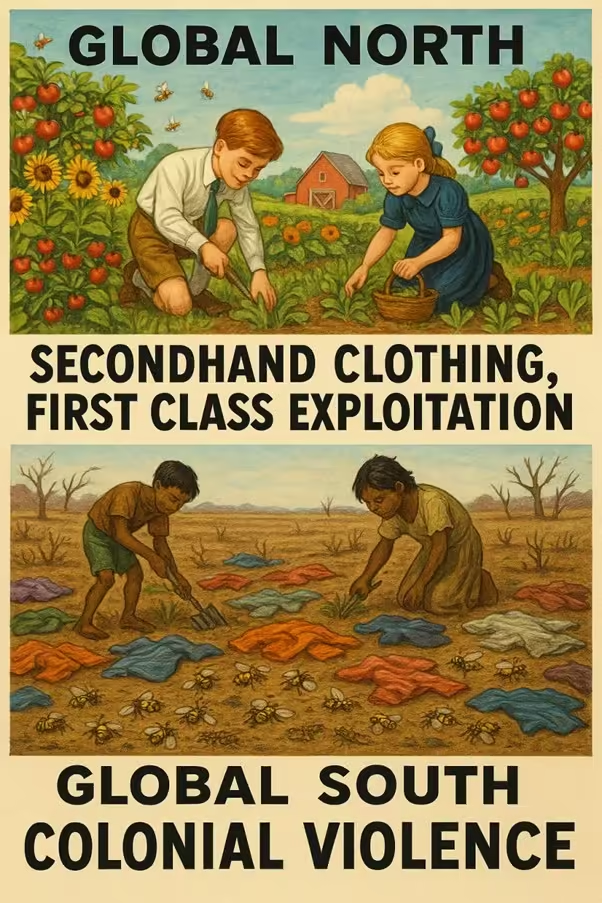"Again and again...demonstrating the global injustice of secondhand clothing While the Global North thrives with healthy farms and ecosystems as I always say... 'by-design', the Global South suffers under mountains of textile waste—non producing soil, killing pollinators, and reinforcing cycles of poverty. This is not charity—it's colonial violence in poor disguise."
Dr. Lee Ann Teal Rutkovsky's words are a stark and challenging indictment of the global secondhand clothing trade. Far from a benevolent act of charity, she argues, it's a system perpetuating a form of "Secondhand Clothing Imperialism," where the waste generated by the Global North is dumped upon the Global South, with devastating environmental and social consequences.
The Stark Divide: Thriving North, Suffering South
Dr. Rutkovsky paints a picture of stark worldwide injustice. The "Global North," the industrialized and often wealthier nations, enjoys thriving ecosystems and agricultural lands, implicitly "by-design," suggesting a systemic advantage built into their economic structures. This prosperity, however, comes at a cost. The fast fashion industry and unsustainable consumption patterns in the North generate mountains of textile waste.

The "Global South," often developing nations, becomes the dumping ground for this waste. The consequences are dire: soil degradation, the destruction of pollinator populations, and the reinforcement of existing cycles of poverty. The sheer volume of discarded clothing overwhelms local waste management systems, creating environmental catastrophes and solidifying the dynamics of Secondhand Clothing Imperialism.
Environmental Devastation: Beyond the Landfill
The environmental damage goes far beyond simply filling landfills. Textile waste, particularly synthetic fibers, contributes significantly to microplastic pollution, contaminating waterways and entering the food chain. Dyes and chemical treatments used in clothing production can leach into the soil and water. Poisoning ecosystems and harming human health. The destruction of pollinator populations, as Dr. Rutkovsky points out, has cascading effects on agriculture and biodiversity. These ecological burdens disproportionately fall on the Global South, a clear consequence of secondhand clothing imperialism.
Economic Exploitation: Undermining Local Industries
The influx of cheap secondhand clothing undermines local textile industries in the Global South. Unable to compete with the flood of discarded goods, local businesses struggle to survive, hindering economic development and perpetuating dependency. Instead of fostering sustainable livelihoods, the secondhand clothing trade, in this view, reinforces existing power imbalances. This economic aspect is a crucial pillar of secondhand clothing imperialism, keeping developing nations reliant on external markets rather than building their own self-sufficient economies.
"Colonial Violence in Poor Disguise": A Powerful Analogy
Dr. Rutkovsky's most provocative claim is that this system constitutes "colonial violence in poor disguise." The analogy to historical colonialism is deliberate and powerful. Just as colonial powers extracted raw materials and wealth from colonized territories, the Global North, in this view, is effectively "extracting" the right to pollute and dispose of its waste in the Global South. The "charity" narrative masks a system of exploitation. Where the Global South bears the environmental and social costs of the North's consumption. This redefines the nature of the issue. Exposing secondhand clothing imperialism for what it truly is: a continuation of historical power imbalances.
A Call for Reckoning and Change
Dr. Rutkovsky's statement is a call for a fundamental re-evaluation of the worldwide fashion industry and our consumption habits. It challenges us to move beyond simplistic notions of charity and confront the systemic injustices embedded within the secondhand clothing trade. The rapid production cycles and immense scale of operations by ultra-fast fashion giants like Shein exacerbate these worldwide issues. Contributing significantly to the very mountains of waste and environmental degradation Dr. Rutkovsky highlights. To delve deeper into how one of the biggest names in this industry impacts our Earth, exploring specific concerns around labor practices, resource consumption, and the immense volume of disposable garments, you can read more about Shein's Environmental Impact: A Call for Change on The People's Hub.
Ultimately, sustainable solutions require a profound shift. It means transforming production and consumption patterns in the Global North. Actively supporting genuine economic development and local textile industries in the Global South. Also stringently addressing the environmental consequences of textile waste at every stage. Only by dismantling the structures that enable secondhand clothing imperialism can we move towards a truly just and equitable system—one that respects both people and Earth, and unequivocally rejects colonial violence in any disguise.
